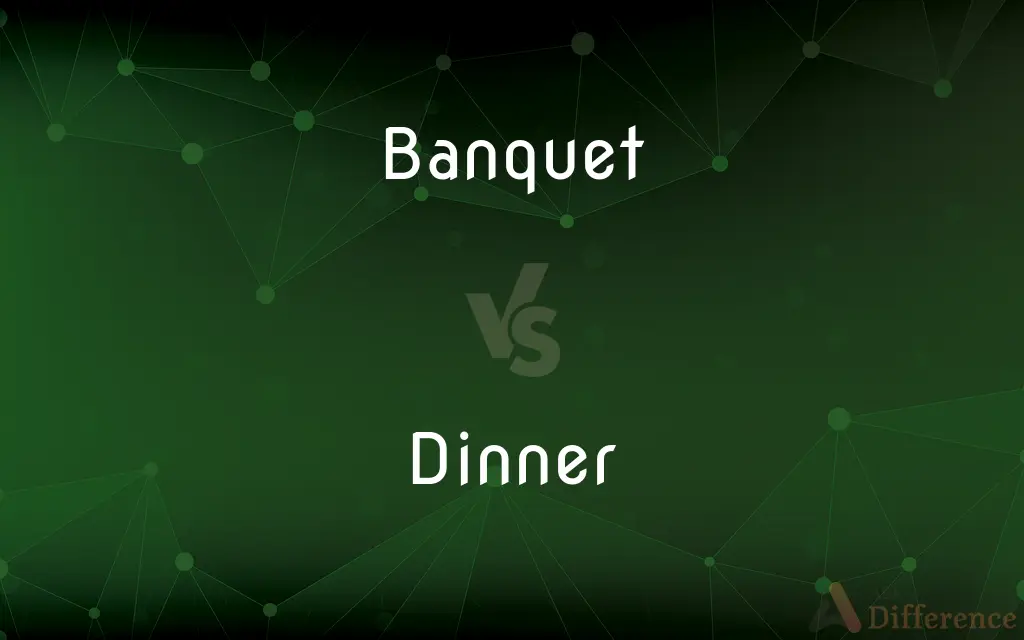Banquet vs. Dinner — What's the Difference?
By Fiza Rafique & Maham Liaqat — Updated on February 27, 2024
A banquet is a large, formal meal for many people, often for a special event, featuring elaborate preparations. Dinner refers to the main meal of the day, which can vary in formality and size.

Difference Between Banquet and Dinner
Table of Contents
ADVERTISEMENT
Key Differences
Banquets are characterized by their grand scale and formal nature, typically organized to celebrate significant events, ceremonies, or to honor guests. They involve extensive planning, a wide variety of dishes, and are often accompanied by entertainment or speeches. Dinner, in contrast, is a more general term that denotes the main meal of the day. It can range from casual family gatherings to formal affairs, but it lacks the ceremonial and large-scale implications of a banquet. The flexibility of dinner allows it to adapt to different cultural norms and personal preferences.
Banquets represent a communal and celebratory dining experience, dinner focuses on the act of eating the main meal, irrespective of the number of attendees or the level of formality. Banquets are events in themselves, whereas dinners are daily occurrences that can be or not be events.
The preparation for a banquet involves meticulous attention to the menu, decorations, and program of activities, reflecting its significance and the effort to impress and cater to a large number of guests. Dinner preparations, however, can be as simple or as complex as the occasion demands, without the inherent expectation of grandeur.
Banquets often serve as platforms for social interaction, networking, and celebration of milestones, embodying a sense of community and festivity. Dinners, while they can also be social and celebratory, primarily serve the practical purpose of nourishment and can be a daily routine rather than a special occasion.
Comparison Chart
Definition
A large, formal meal for many people, usually for a special occasion.
The main meal of the day, varying in formality.
ADVERTISEMENT
Scale
Large and formal.
Can range from intimate to large gatherings.
Occasion
Celebratory events, ceremonies.
Daily occurrence, can be casual or formal.
Preparation
Extensive with attention to detail.
Varies, can be simple or elaborate.
Social Function
Celebrates significant events, fosters community.
Focuses on nourishment, can be social.
Compare with Definitions
Banquet
An event with extensive food offerings.
The university's annual banquet welcomed hundreds of alumni.
Dinner
A meal that can be formal or casual.
The dinner at the conference was an elegant affair.
Banquet
A meal signifying celebration and social gathering.
The company's success was commemorated with a lavish banquet.
Dinner
The evening meal, regardless of formality.
Dinner was simple but delicious, with fresh vegetables and grilled chicken.
Banquet
A gathering that involves ceremonial dining.
The knights were honored at the royal banquet.
Dinner
The main meal of the day, typically in the evening.
We had a quiet dinner at home.
Banquet
A feast held for a special occasion.
The couple celebrated their anniversary with a grand banquet.
Dinner
An occasion for family or friends to gather and eat.
Sunday dinner is a tradition in our family.
Banquet
A formal, elaborate meal for many people.
The charity gala concluded with a luxurious banquet.
Dinner
A meal that varies in complexity based on the context.
Our anniversary dinner was at a five-star restaurant.
Banquet
A banquet (; French: [bɑ̃kɛ]) is a formal large meal or feast, where a number of people consume food together. Banquets are traditionally held to enhance the prestige of a host, or reinforce social bonds among joint contributors.
Dinner
Dinner usually refers to what is in many Western cultures the largest and most formal meal of the day, which some Westerners eat in the evening. Historically, the largest meal used to be eaten around midday, and called dinner.
Banquet
An elaborate and formal evening meal for many people
A state banquet at Buckingham Palace
Dinner
The main meal of the day, often eaten in the evening.
Banquet
A large celebratory meal; a feast.
Dinner
The principal meal of the day, eaten in some countries about midday, but in others (especially in the U. S. and in large cities) at a later hour.
Banquet
A ceremonial dinner party for many people.
Dinner
The main meal of the day served in the evening or at midday;
Dinner will be at 8
On Sundays they had a large dinner when they returned from church
Banquet
A ceremonial dinner party for many people
Dinner
A party of people assembled to have dinner together;
Guests should never be late to a dinner party
Banquet
A meal that is well prepared and greatly enjoyed;
A banquet for the graduating seniors
The Thanksgiving feast
They put out quite a spread
Common Curiosities
How do banquets differ from dinners in terms of preparation?
Banquets require extensive preparation, including menu planning, decorations, and entertainment, unlike dinners, which can range from minimal to elaborate preparations.
What types of occasions are banquets held for?
Banquets are held for significant events such as weddings, anniversaries, corporate gatherings, and award ceremonies.
Can a dinner be considered a banquet?
A dinner can evolve into a banquet if it meets the criteria of scale, formality, and occasion typically associated with banquets.
What is the social significance of banquets?
Banquets play a crucial role in social bonding, networking, and celebrating communal achievements or milestones.
How are dinner menus compared to banquet menus?
Dinner menus are typically simpler and cater to personal or family preferences, whereas banquet menus are more elaborate, designed to impress and cater to a wide range of tastes.
What defines a banquet?
A banquet is defined as a large, formal meal prepared for many people to celebrate a special occasion or event.
What is the typical setting for a dinner?
Dinner settings can vary widely, from a casual meal at home to a formal gathering in a restaurant or banquet hall.
Can the term "dinner" refer to a meal at any time of day?
Historically, "dinner" referred to the main meal of the day, which could occur at different times, but it most commonly refers to the evening meal in contemporary usage.
How does the purpose of a dinner differ from that of a banquet?
The primary purpose of dinner is nourishment and possibly social interaction, while a banquet aims to celebrate, honor, or mark a special occasion with grandeur.
Can banquets be informal?
Traditionally, banquets are formal events, but the concept can be adapted to less formal settings depending on cultural and personal preferences.
Is there a specific time of day for banquets?
While banquets often take place in the evening, they can be scheduled at any time of day depending on the event.
Why are banquets important in corporate or organizational contexts?
In corporate or organizational contexts, banquets serve as opportunities for networking, celebrating achievements, and fostering a sense of community and shared goals.
What role does food play in a banquet versus a dinner?
In both banquets and dinners, food is central, but banquets emphasize variety, abundance, and presentation to a greater extent.
What factors influence the transition of a dinner into a banquet?
Factors include the number of guests, the level of formality, the occasion being celebrated, and the extent of preparations and festivities surrounding the meal.
How do cultural differences impact the definition of dinner?
Cultural differences can significantly impact what is considered dinner, including the time of day it is eaten, the types of food served, and the level of formality.
Share Your Discovery

Previous Comparison
Dictionary vs. Glossary
Next Comparison
Misconstrue vs. ConstrueAuthor Spotlight
Written by
Fiza RafiqueFiza Rafique is a skilled content writer at AskDifference.com, where she meticulously refines and enhances written pieces. Drawing from her vast editorial expertise, Fiza ensures clarity, accuracy, and precision in every article. Passionate about language, she continually seeks to elevate the quality of content for readers worldwide.
Co-written by
Maham Liaqat












































